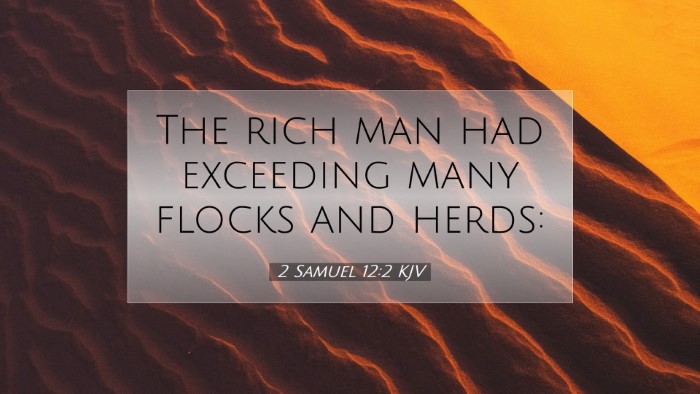Commentary on 2 Samuel 12:2
Verse: "The rich man had many flocks and herds." (2 Samuel 12:2)
Introduction
In this crucial moment of 2 Samuel 12, the prophet Nathan delivers a striking parable to King David. This verse sets the stage for Nathan's confrontation regarding David's sin with Bathsheba. We delve into the richness of this verse, extracting insights and reflections from notable public domain commentators such as Matthew Henry, Albert Barnes, and Adam Clarke.
Contextual Analysis
The context of this chapter is essential. After David's grievous acts of adultery and murder, God sends Nathan to address David's sin. Before directly confronting David, Nathan uses a parable about a rich man and a poor man to illustrate injustice and to elicit a deeper understanding of David's own actions.
Matthew Henry's Insights
According to Matthew Henry, the rich man's extensive possessions symbolize not just wealth but a lack of compassion. This man had everything, yet he chose to take from the poor man, who possessed nothing but a single lamb. Henry emphasizes that the rich man's character reflects a heart that is not in tune with righteousness — he is greedy, selfish, and unjust.
Henry further elaborates that this serves as a mirror for David. The parable forces David to recognize the gravity of his own actions. Just as the rich man exploited the poor man's only possession, David exploited Bathsheba, disregarding her dignity and her husband's life.
Albert Barnes' Perspective
Albert Barnes provides a complementary analysis, drawing attention to the societal norms of wealth and poverty in ancient Israel. He describes the rich man’s possession of “many flocks and herds” as a representation of prosperity contrasted with the plight of the poor man, who owned just "one little ewe lamb."
Barnes highlights that this disparity serves to amplify the heinousness of the rich man's actions. By taking what was precious to another, he not only demonstrated a moral failing but also illustrated the extensive consequences of sin — affecting lives, families, and communities.
Adam Clarke's Commentary
Adam Clarke presents a detailed exploration of the symbolism within this verse. For him, the rich man's multiple flocks signifies abundance that should evoke a sense of responsibility, yet he chose to act in a manner that was totally opposite to what his wealth should engender: compassion and generosity.
Clarke's commentary delves deep into the character of the rich man, noting that his actions reveal a heart hardened by wealth. This resonates with biblical principles where material prosperity can lead to moral decay if not countered with humility and grace.
Theological Implications
Theologically, this verse lays a foundation for understanding sin, justice, and divine accountability. David’s reaction to Nathan’s parable provides insights into the nature of repentance. When he is confronted, it prompts a recognition of his sin and subsequently leads to his heartfelt repentance.
Furthermore, this narrative points to the overarching theme of God's justice. The rich man’s injustice becomes a vivid foreshadowing of the consequences that await those who exploit the vulnerable. God's care for the weak and needy is evident throughout Scripture, and David’s transgressions starkly contrast with this divine attribute.
Conclusion
In exploring 2 Samuel 12:2, we see a warning against moral blindness and the seduction of power. Through the lens of Matthew Henry, Albert Barnes, and Adam Clarke, we are reminded of the serious implications of our actions and the importance of recognizing our failings.
This commentary serves as a call to vigilance for pastors, students, theologians, and Bible scholars. It invites reflection not only on the historical context of David's story but also on our personal lives. In a world rife with injustice, may we be practitioners of mercy, ever mindful of our responsibilities towards those around us.


